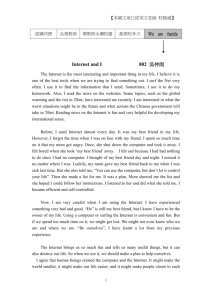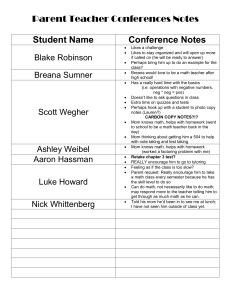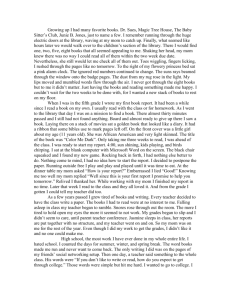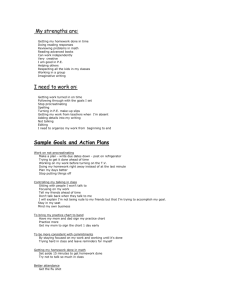An MIT student Rebecca Faery Recitation 1 Reading and Writing the Essay
advertisement
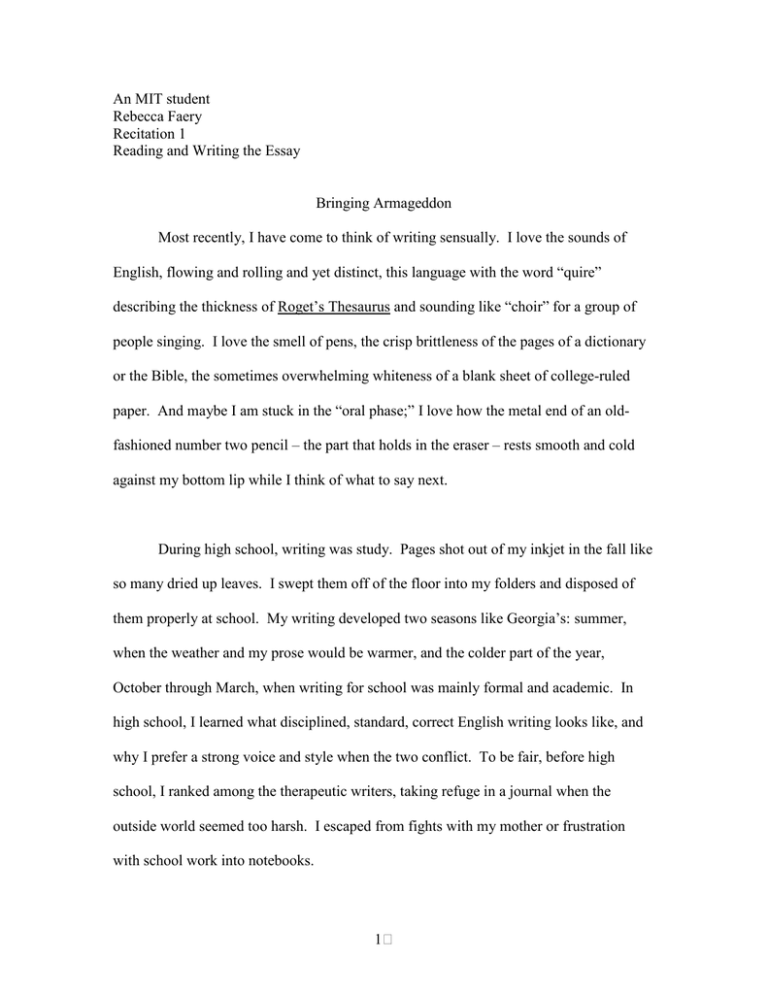
An MIT student Rebecca Faery Recitation 1 Reading and Writing the Essay Bringing Armageddon Most recently, I have come to think of writing sensually. I love the sounds of English, flowing and rolling and yet distinct, this language with the word “quire” describing the thickness of Roget’s Thesaurus and sounding like “choir” for a group of people singing. I love the smell of pens, the crisp brittleness of the pages of a dictionary or the Bible, the sometimes overwhelming whiteness of a blank sheet of college-ruled paper. And maybe I am stuck in the “oral phase;” I love how the metal end of an oldfashioned number two pencil – the part that holds in the eraser – rests smooth and cold against my bottom lip while I think of what to say next. During high school, writing was study. Pages shot out of my inkjet in the fall like so many dried up leaves. I swept them off of the floor into my folders and disposed of them properly at school. My writing developed two seasons like Georgia’s: summer, when the weather and my prose would be warmer, and the colder part of the year, October through March, when writing for school was mainly formal and academic. In high school, I learned what disciplined, standard, correct English writing looks like, and why I prefer a strong voice and style when the two conflict. To be fair, before high school, I ranked among the therapeutic writers, taking refuge in a journal when the outside world seemed too harsh. I escaped from fights with my mother or frustration with school work into notebooks. 1 It seems my writing began this way, in discontent. My oldest extant work is a short Christmas story called “The Littlest Elf,” circa late first grade. Santa’s smallest elf, more competent than those around her, feels isolated from her peers; she resembles my five year old self physically as well. I differed from other students in grade school: I spent all my free time reading; I spoke in larger words; I didn’t pay attention to what I wore until sixth grade. And I wrote profusely without ever truly mastering cursive script. That, in reverse chronological order, is the history of my writing, that I have always loved it, and in short, that I have wanted to be a writer for as long as I can remember. It may seem odd then that, excepting the first few months after his death, I don’t remember ever wanting to have my father back. This may be partially because I cannot remember having him in the first place. But let me start at the end again. My father took his life when I was five years old. Alright. Now for the beginning. Kingston Eric Lisk was born in what I imagine to be a small town in Illinois to an alcoholic man and his quarrelsome second wife. He had many siblings and half siblings but excelled among them by going to college, where he obtained a studied business and pre-law, and then to law school, where he met and married my mother. By all accounts (or by my mother's, the only one that I have heard), Kingston was intelligent, funny, handsome, slightly overenthusiastic about the SpaceQuest series of computer games, and – here’s the kicker – alcoholic. Laura, my mother's best friend from college her maid of honor, told my mom she “didn’t have to go through with” my parent's wedding. My mother declined Laura’s advice, entering into a two and a half year marriage that would leave her bankrupt and alone raising an infant daughter. To be fair again, 2 though, she emerged with her juris doctor and a position as an attorney in the Navy. My father met the official, legal end of their marriage with much less: no steady job, no degree, and no recollection of what he did most nights. He had gained during the marriage, too, however; by the time my parents actually divorced, Kingston had two extra children and a common law second wife. The years of Kingston’s life between his divorce from my mother and his suicide are a mystery to me; I cannot imagine that they went well. In any case, his actions of April 1991 brought new elements into my life, as well: I went with my mom to Florida, though we missed Kingston’s funeral; I went with my mom to the Navy base’s Father’s Day Picnic, though I missed strong dad-arms wheelbarrow racing me across the field; and I went with my mom to therapy, which involved a lot of writing and was completely satisfactory. I went a long time without being angry at my father for the awkwardness of simple things, friends asking “where is your dad;” drawing pictures of a two-person, onedog family for class. I felt him as a negative presence, benevolent and watching over me. I got angry at Kingston when my mother finally decided seven years later that I was old enough to know he’d committed suicide, at which point in time I also got very angry at Mom. The revelation did make for months, if not years, of easy writing. How, I wondered, and explored again and again in journal entries, how could my mother marry an alcoholic man, my mother, who held everything in my life together over ten years and five states? How could she blind herself to what a horrible person my father must have been? How could she hide his horribleness from me? Then there were questions about my father, namely, how could he have been that horrible; how could his 3 life have been so horrible that he had to end it? The most disturbing, looking back, are the questions I wrote down about me: “what did I do to make my father’s life miserable? What could I have done to stop him?” Even at twelve I recognized that I had been too young to actively help my father. “What does it mean,” I wrote once, “that I come from a person who could do this to himself and his family?” And the underlying question there was, am I like him? This question became a subconscious driving force for decisions I made. My father dropped of school; I would work hard for good grades. My father couldn’t keep a job; I would be a leader in many clubs. My father lost all of his and my mother’s money; I would save allowance for college starting in seventh grade. My father was an alcoholic; I would never drink alcohol or try any other kind of drug. My father didn’t have strong ties to the world; I would invest deeply in making a few close friends. My father failed at living; I would not be like him. About three years ago, I attended the Sewanee Young Writers’ Conference in Tennessee. As a member of the fiction section of the two-week program, I was tasked with writing a ten-page short story. The conference expected me to string more words together than I had ever attempted to use in one piece before. I called home and mentioned the problem to Mom. Did she have any ideas? Yes; she had been going through some old files and found a story my dad wrote back in law school. She hadn’t read it, she said, but maybe it would provide some inspiration. Did I want her to fax it? “Sure, I guess.” It was odd because we never talked about my father. We still don’t. I asked one of the Conference staff how I could get a fax and called Mom back 4 with the number. We had breached the subject of my father that day, and I the air felt thick on my side of the phone. Yes, I was eating well, I assured her. Yes, she told me, the cats and dogs were doing fine, but they missed me. The fax came later that day, and I had my first real communication with my father. His short story, actually a forty-page novella called Bringing Armageddon, depicted a general on his deathbed. The man had led well in war, not brilliantly, but very well, and in a renewed conflict after some years of peace, heavy armaments were being used to attack the enemy based on his wartime policy suggestions. The U.S. was about to deploy a bomb that would lead to near complete destruction, if not initially then trough other countries’ retaliations. As the general, now an old man contemplated his service in battle, he realized that he had been wrong all of his life and that his decisions were bringing about the end of the world, bringing Armageddon. In his last moments, the general struggled to get word to officials that what they were doing, what he had been doing his whole life, was wrong, but he died before contacting anyone. And his death was not a noble death; his revelation had come too late to bring redemption. Forty pages of typewritten text, twice read in the span of two hours, told me more about my father than years of questioning myself and strained hours of questioning my mother ever had. The amazing thing was that, more than being all too apt a metaphor for what I now imagine happened to my father, at least in his mind, near the end of his life, the writing was good. Not brilliant, but immensely better than I expected from the onedimensional image of my father I’d carried around for so many years. 5 When I got home from the Young Writer’s Conference, I found the box my mom had been going through in the garage, and inside, a journal of my father’s. Interspersed among the secret maneuvers for computer games comprising the majority of the notebook were ideas for short stories, character sketches, notes from some lectures for a class. My father, I realized as I read, had been intelligent; funny; sure, I could believe handsome; and hugely overenthusiastic about SpaceQuest. He wasn’t just an alcoholic, and I wasn’t just an alcoholic’s daughter. Far from the confirmation I expected I needed, that I was not like my father and would not become him, I found out that my father was like me. I had been wrong to deny him all those years. Mom asked me a little later if the fax had been any help; she had since read my story from the conference and my father's novella and didn’t see a direction connection. Did I know, Mom asked, that my father always wanted to be a writer – on the side, of course? I had gathered that from his story. I watched my mom for a minute, then shook my head and smiled. “Yeah, the story helped a lot. Thank you.” 6


